Leo XIV: Let us build a world based on truth, justice, and peace
This morning, Leo XIV received the Diplomatic Corps accredited to the Holy See and encouraged the ambassadors to work together to build a world in which everyone "can realize their own humanity in truth, justice, and peace"
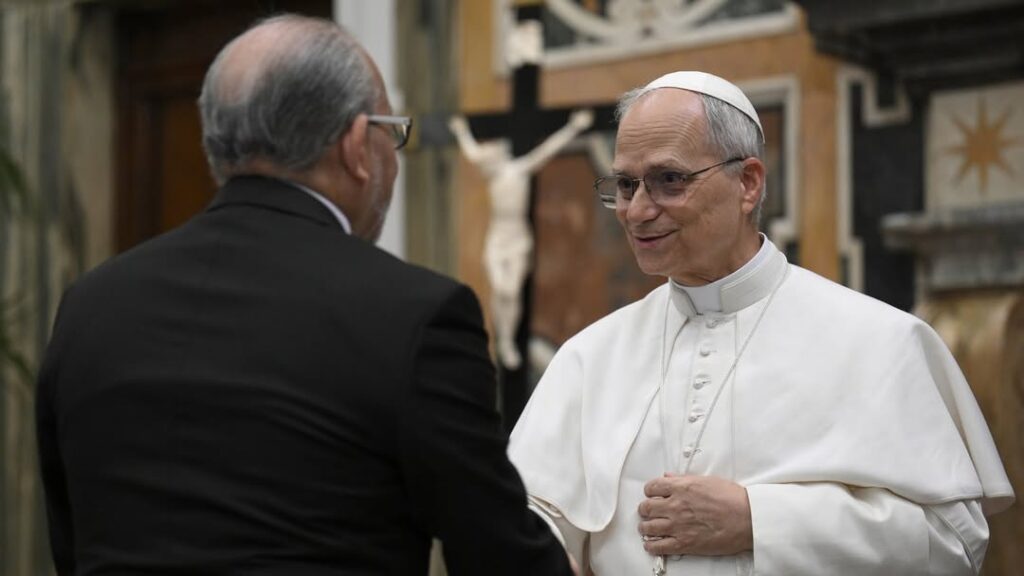
Peace, justice, and truth: These are the three “pillars” of the Church’s missionary action and the work of the Holy See’s diplomacy, which Pope Leo XIV indicated in his address to the Diplomatic Corps accredited to the Holy See, received this morning at the Vatican.
The Pontiff first expressed his gratitude for the cordial words of the Ambassador of the Republic of Cyprus and Dean of the Diplomatic Corps, George Poulides. Addressing the entire Diplomatic Corps, he expressed his gratitude for the numerous messages of congratulations sent on the occasion of his election, including from countries with which the Holy See does not maintain diplomatic relations. “This is,” he specified, “a significant expression of esteem, which encourages us to deepen our mutual relations.”
The Holy Father recalled that papal diplomacy “is animated by a pastoral urgency that impels it not to seek privileges, but to intensify its evangelical mission in the service of humanity.”
It combats indifference and continually appeals to consciences, as my venerable Predecessor tirelessly did, always attentive to the cry of the poor, the needy, and the marginalized, as well as to the challenges that characterize our time, from the protection of creation to artificial intelligence.
Crossing Borders and Encountering Different Cultures
“Your presence today is for me a gift, allowing us to renew the Church’s aspiration—and my own—to reach out and embrace every people and every person of this earth, yearning for and in need of truth, justice, and peace,” the Pope added, recalling his own life experience, spent between North and South America, and Europe, which “reveals this aspiration to cross borders to encounter different people and cultures.”
Referring to his experience as Prior General of the Augustinians, which led him to visit various countries throughout his life, he expressed his intention to “consolidate knowledge and dialogue with you and your countries” through the constant and patient work of the Secretariat of State. Trusting in Divine Providence, he expressed his hope of being able to “confirm in the faith so many brothers and sisters scattered throughout the world and build new bridges with all people of good will.”
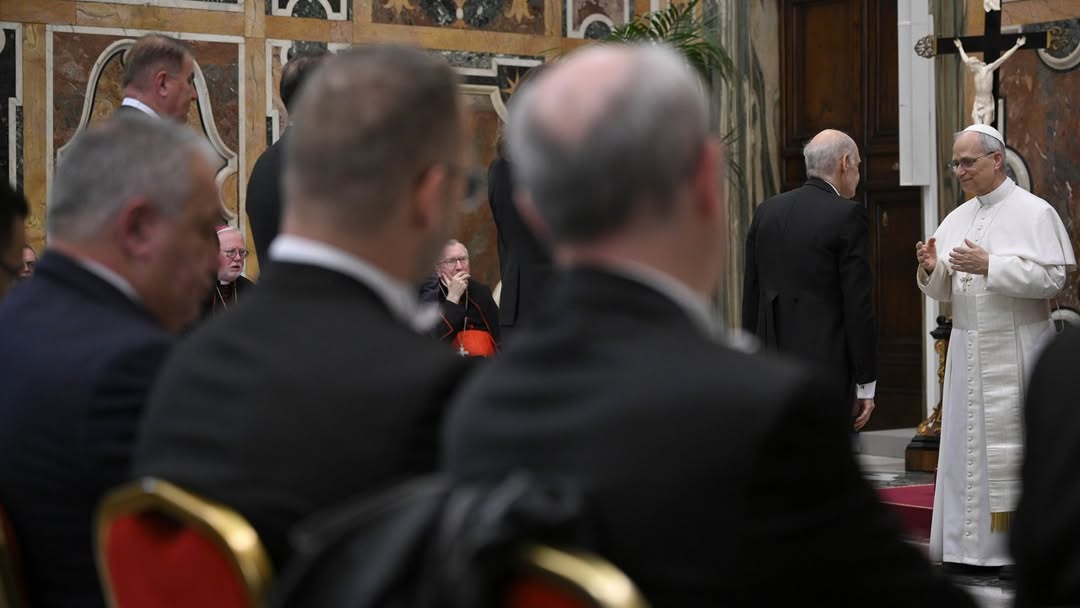
Peace is an active gift
Leo XIV then paused on the pillar of “peace” and observed that it is often considered a “negative” word, that is, “as the mere absence of war or conflict, because opposition is part of human nature and always accompanies us, all too often driving us to live in a constant ‘state of conflict’; at home, at work, in society.”
Peace then seems like a simple truce, a pause between one discord and another, because, no matter how hard one tries, tensions are always present, a bit like embers burning beneath the ashes, ready to rekindle at any moment.
“From the Christian perspective—as well as from other religious experiences—peace is above all a gift, the first gift of Christ: ‘I give you my peace.’ But it is an active, passionate gift,” he emphasized, “that affects and involves each one of us, regardless of cultural origin and religious affiliation, and that first and foremost requires work on oneself.”
Peace is built in the heart and from the heart, eradicating pride and demands, and measuring language, because one can also hurt and kill with words, not only with weapons.
Extirpating the Premises of Any Conflict
In this light, he indicated the fundamental contribution that religions and interreligious dialogue can make to foster contexts of peace. “This, naturally, demands full respect for religious freedom in every country, because religious experience is a fundamental dimension of the human person, without which it is difficult—if not impossible—to achieve the purification of the heart necessary to build relationships of peace.” Through this work, “which we are all called to do, we can eradicate the foundations of any conflict and any destructive desire for conquest,” he stated.
This also demands a sincere willingness to engage in dialogue, animated by the desire to engage rather than confront one another. From this perspective, it is necessary to revitalize multilateral diplomacy and those international institutions that were intended and conceived primarily to resolve conflicts that may arise within the international community.
And in this regard, he referred to Pope Francis’s latest Urbi et Orbi Message: “Peace is also not possible without true disarmament, and the need of each people to provide for its own defense cannot be transformed into a general race for rearmament.”
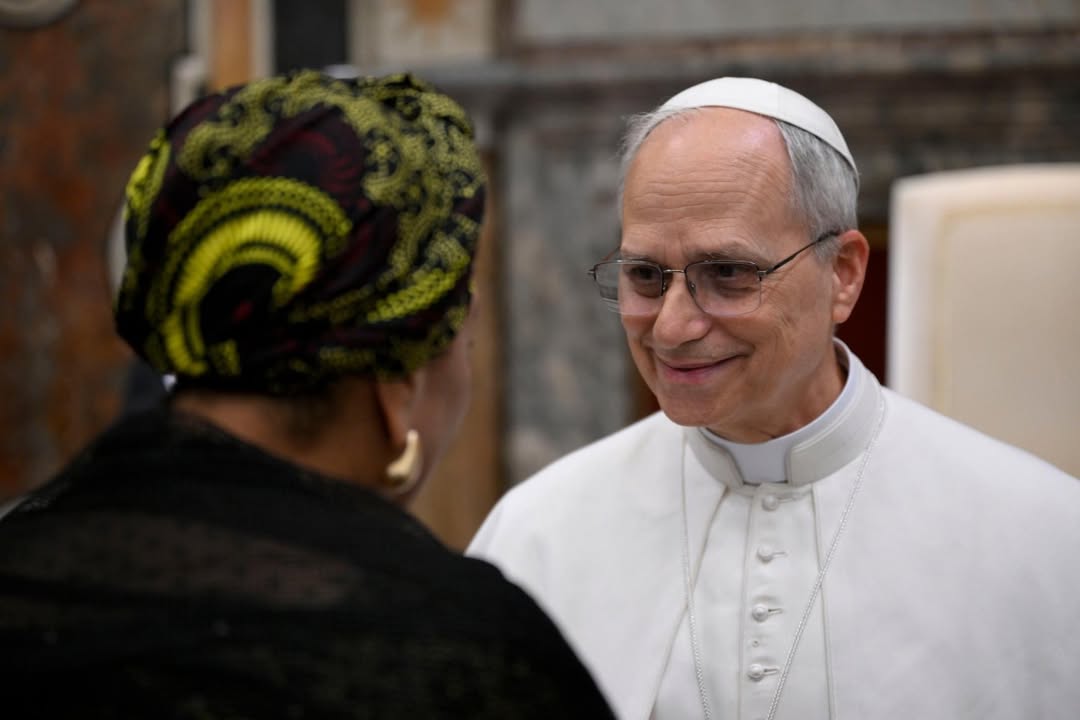
Seeking peace requires practicing justice
The second word the Pope reflected on was justice, which is necessary to achieve peace. “Seeking peace requires practicing justice,” the Pope affirmed. He explained the reason for choosing its name: “thinking primarily of Leo XIII, the Pope of the first great social encyclical, Rerum Novarum, which gave impetus to the Church’s commitment to justice among peoples.”
In the changing times we are experiencing, the Holy See cannot refrain from making its voice heard in the face of the numerous imbalances and injustices that lead, among other things, to undignified working conditions and increasingly fragmented and conflict-ridden societies. It is also necessary to strive to remedy global inequalities, which leave deep wounds of affluence and poverty between continents, countries, and even within societies themselves.
Protecting the dignity of every person
“It is the task of those responsible for government to dedicate themselves to building harmonious and peaceful civil societies,” the Holy Father continued, indicating that this “can be achieved above all by investing in the family, founded on the stable union between man and woman.” Furthermore, “no one can refrain from fostering contexts in which the dignity of every person is protected, especially the most fragile and defenseless, from the unborn child to the elderly, from the sick to the unemployed, whether they be citizens or immigrants,” he noted.
Returning to his own personal story, “that of a citizen, descendant of immigrants, who himself has emigrated,” he added:
Each of us, in the course of life, may find ourselves healthy or sick, employed or unemployed, in our homeland or in a foreign land. Our dignity, however, is always the same: that of a creature cherished and loved by God.
The Church can never refrain from speaking the truth.
Finally, the third word: truth. “Truly peaceful relations cannot be built, even within the international community, without truth,” Pope Leo indicated. He specified that “where words take on ambiguous and ambivalent connotations, and the virtual world, with its distorted perception of reality, prevails unchecked, it is difficult to build authentic relationships, because the objective and real premises of communication decline.”
“For its part, the Church can never refrain from speaking the truth about humanity and the world, resorting to whatever is necessary, even to frank language, which may initially arouse some misunderstanding,” he emphasized. Truth, however, is never separated from charity, which is always rooted in concern for the life and good of every man and woman.”
Truth does not distance us; on the contrary, it allows us to face with greater vigor the challenges of our time, such as migration, the ethical use of artificial intelligence, and the protection of our beloved earth. These are challenges that require the commitment and collaboration of all, because no one can imagine facing them alone.
The Jubilee of Hope, a Time of Conversion
“My ministry begins at the heart of the Jubilee Year, dedicated in a particular way to hope,” the Pontiff affirmed before concluding his address. “It is a time of conversion and renewal,” he noted, and above all, “an opportunity to leave conflict behind and begin a new path, encouraged by the hope of being able to build, working together, each according to his or her own sensibilities and responsibilities, a world in which each of us can fulfill our humanity in truth, justice, and peace.”
“I hope this can happen in all contexts, beginning with those that suffer the most, such as Ukraine and the Holy Land,” the Holy Father concluded, thanking everyone for the work they do to “build bridges between their countries and the Holy See.”
Full text:
Your Eminence,
Your Excellencies,
Ladies and Gentlemen,
Peace be with you!
I thank His Excellency Mr George Poulides, Ambassador of the Republic of Cyprus and Dean of the Diplomatic Corps, for his cordial greeting in your name, and for the tireless work that he has carried out with his characteristic energy, commitment and kindness. These qualities have earned him the esteem of all my predecessors whom he has met in these years of his mission to the Holy See, particularly the late Pope Francis.
I would also like to express my gratitude for your many messages of good wishes following my election, as well as those expressing condolence for the death of Pope Francis. Some of those messages also came from countries with which the Holy See does not have diplomatic relations, a significant sign of esteem that indicates a strengthening of mutual relations.
In our dialogue, I would like us always to preserve the sense of being a family. Indeed, the diplomatic community represents the entire family of peoples, a family that shares the joys and sorrows of life and the human and spiritual values that give it meaning and direction. Papal diplomacy is an expression of the very catholicity of the Church. In its diplomatic activity, the Holy See is inspired by a pastoral outreach that leads it not to seek privileges but to strengthen its evangelical mission at the service of humanity. Resisting all forms of indifference, it appeals to consciences, as witnessed by the constant efforts of my venerable predecessor, ever attentive to the cry of the poor, the needy and the marginalized, as well as to contemporary challenges, ranging from the protection of creation to artificial intelligence.
In addition to being a visible sign of your countries’ respect for the Apostolic See, your presence here today is a gift for me. It allows me to renew the Church’s aspiration — and my own — to reach out and embrace all individuals and peoples on the Earth, who need and yearn for truth, justice and peace! In a certain sense, my own life experience, which has spanned North America, South America and Europe, has been marked by this aspiration to transcend borders in order to encounter different peoples and cultures.
Through the constant and patient work of the Secretariat of State, I intend to strengthen understanding and dialogue with you and with your countries, many of which I have already had the grace to visit, especially during my time as Prior General of the Augustinians. I trust that God’s providence will allow me further occasions to get to know the countries from which you come and enable me to have occasions to confirm in the faith our many brothers and sisters throughout the world and to build new bridges with all people of good will.
In our dialogue, I would like us to keep in mind three essential words that represent the pillars of the Church’s missionary activity and the aim of the Holy See’s diplomacy.
The first word is peace. All too often we consider it a “negative” word, indicative only of the absence of war and conflict, since opposition is a perennial part of human nature, frequently leading us to live in a constant “state of conflict” at home, at work and in society. Peace then appears simply as a respite, a pause between one dispute and another, given that, no matter how hard we try, tensions will always be present, a little like embers burning beneath the ashes, ready to ignite at any moment.
From a Christian perspective – but also in other religious traditions – peace is first and foremost a gift. It is the first gift of Christ: “My peace I give to you” (Jn 14:27). Yet it is an active and demanding gift. It engages and challenges each of us, regardless of our cultural background or religious affiliation, demanding first of all that we work on ourselves. Peace is built in the heart and from the heart, by eliminating pride and vindictiveness and carefully choosing our words. For words too, not only weapons, can wound and even kill.
In this regard, I believe that religions and interreligious dialogue can make a fundamental contribution to fostering a climate of peace. This naturally requires full respect for religious freedom in every country, since religious experience is an essential dimension of the human person. Without it, it is difficult, if not impossible, to bring about the purification of the heart necessary for building peaceful relationships.
This effort, in which all of us are called to take part, can begin to eliminate the root causes of all conflicts and every destructive urge for conquest. It demands a genuine willingness to engage in dialogue, inspired by the desire to communicate rather than clash. As a result, there is a need to give new life to multilateral diplomacy and to those international institutions conceived and designed primarily to remedy eventual disputes within the international community. Naturally, there must also be a resolve to halt the production of instruments of destruction and death, since, as Pope Francis noted in his last Urbi et Orbi Message: No peace is “possible without true disarmament [and] the requirement that every people provide for its own defence must not turn into a race to rearmament.” [1]
The second word is justice. Working for peace requires acting justly. As I have already mentioned, I chose my name thinking first of all of Leo XIII, the Pope of the first great social Encyclical, Rerum Novarum. In this time of epochal change, the Holy See cannot fail to make its voice heard in the face of the many imbalances and injustices that lead, not least, to unworthy working conditions and increasingly fragmented and conflict-ridden societies. Every effort should be made to overcome the global inequalities – between opulence and destitution – that are carving deep divides between continents, countries and even within individual societies.
It is the responsibility of government leaders to work to build harmonious and peaceful civil societies. This can be achieved above all by investing in the family, founded upon the stable union between a man and a woman, “a small but genuine society, and prior to all civil society.” [2] In addition, no one is exempted from striving to ensure respect for the dignity of every person, especially the most frail and vulnerable, from the unborn to the elderly, from the sick to the unemployed, citizens and immigrants alike.
My own story is that of a citizen, the descendant of immigrants, who in turn chose to emigrate. All of us, in the course of our lives, can find ourselves healthy or sick, employed or unemployed, living in our native land or in a foreign country, yet our dignity always remains unchanged: it is the dignity of a creature willed and loved by God.
The third word is truth. Truly peaceful relationships cannot be built, also within the international community, apart from truth. Where words take on ambiguous and ambivalent connotations, and the virtual world, with its altered perception of reality, takes over unchecked, it is difficult to build authentic relationships, since the objective and real premises of communication are lacking.
For her part, the Church can never be exempted from speaking the truth about humanity and the world, resorting whenever necessary to blunt language that may initially create misunderstanding. Yet truth can never be separated from charity, which always has at its root a concern for the life and well-being of every man and woman. Furthermore, from the Christian perspective, truth is not the affirmation of abstract and disembodied principles, but an encounter with the person of Christ himself, alive in the midst of the community of believers. Truth, then, does not create division, but rather enables us to confront all the more resolutely the challenges of our time, such as migration, the ethical use of artificial intelligence and the protection of our beloved planet Earth. These are challenges that require commitment and cooperation on the part of all, since no one can think of facing them alone.
Dear Ambassadors,
My ministry has begun in the heart of a Jubilee Year, devoted in a particular way to hope. It is a time of conversion and renewal and, above all, an opportunity to leave conflicts behind and embark on a new path, confident that, by working together, each of us in accordance with his or her own sensibilities and responsibilities, can build a world in which everyone can lead an authentically human life in truth, justice and peace. It is my hope that this will be the case everywhere, starting with those places that suffer most grievously, like Ukraine and the Holy Land.
I thank you for all the work you are doing to build bridges between your countries and the Holy See, and I cordially impart my blessing to you, your families and your peoples. Thank you! Thank you for all the work that you do!
____________________________________________
[1] FRANCIS, Urbi et Orbi Message, 20 April 2025.
[2] LEO XIII, Encyclical Rerum Novarum, 15 May 1891, 9.
Related

Schedule of Celebrations Presided over by the Holy Father Leo XIV (May 2025)
Exaudi Staff
15 May, 2025
1 min
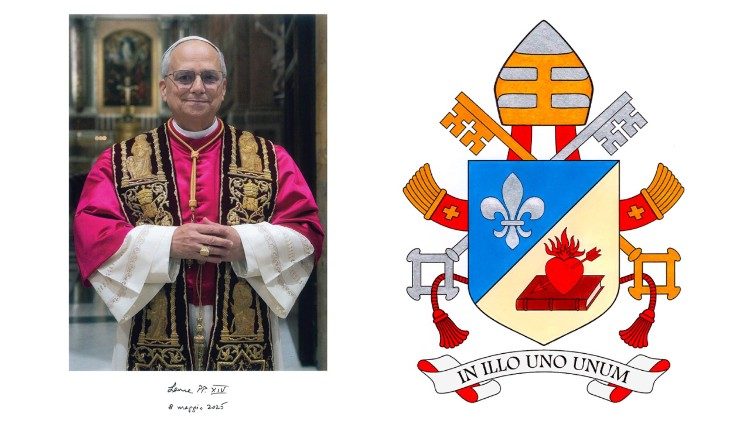
The coat of arms of Leo XIV: a burning heart marked by divine love
Exaudi Staff
15 May, 2025
2 min
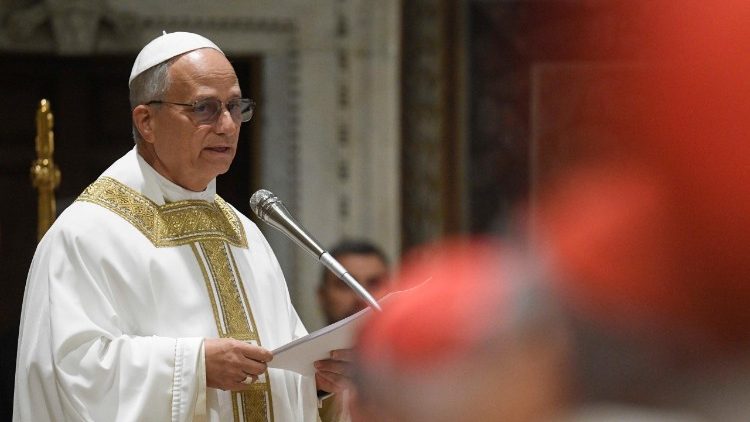
Evangelization and Education: A Joint Journey to Transform the World
Exaudi Staff
15 May, 2025
2 min

Meloni Reaffirms Italy’s Support for Pope Leo XIV’s Peace Efforts
Exaudi Staff
15 May, 2025
1 min
 (EN)
(EN)
 (ES)
(ES)
 (IT)
(IT)

